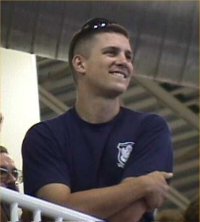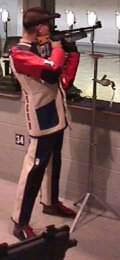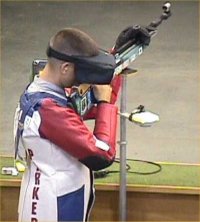INTERVIEW WITH JASON PARKER
Sgt. Jason Parker of the Army Marksmanship Unit in Fort Benning is one of the most successful American shooters and has held several world records. We spoke to him during and after his successful bid to mak the US Olympic team for Sydney. He has gone on to participate in the Olympics three more times, in 2004 in Athens, 2008 in Beijing, and 2012 in London.
Tell me about yourself, how did you get started?
I’ve been shooting ever since I was a little kid. My dad got me my BB gun when I was three years old and I just kind of progressed from there. I started shooting competitively when I was about twelve or thirteen. My dad shot competitively before I was born in high power. He quit when I was born. I got into plinking a little bit, black powder and everything like that. I enjoyed it and when I got old enough he bought me a basic air rifle. I started shooting, I progressed pretty fast and started going to other matches and meeting a lot of people.
What sort of program were you in?
I was in a JROTC in high school. Evetnually I started going to matches with my dad. He’d take me to Colorado Springs or into Iowa, to close matches. I met people and stuck with it.
What sort of equipment are you using?
I have an Anschutz air rifle, Sauer shooting clothes, Kustermann shooting boots, that’s about it. A Sauer glove.
What do you shoot in smallbore?
I shoot an Anschutz 2012, a girl’s rifle (laughs).
Why is that?
I just like the weight a little bit better in standing. I’ve picked up a lot of points with the lighter rifle in standing, and haven’t dropped that many in prone and kneeling with it so I just decided to stick with it.
 Do you batch test the ammunition you shoot? And what sort of ammo do you use?
Do you batch test the ammunition you shoot? And what sort of ammo do you use?
Yes. I shoot RWS pellets and Federal 22.
What’s your most valuable practice drill?
For the most part for practice I just come down and I shoot the course of fire. That’s what the match is, so that’s how I practice. I come down here and I shoot sixty shots of air rifle or I’ll shoot forty shots prone, forty kneeling, and if I’m having troubles that day I’ll maybe shoot a little bit more, or shoot a little less if I’m shooting better.
You don’t specialize more in air rifle?
I have been shooting more air rifle, but for the most part I keep them pretty equal. I usually try to work on my weakest event, and whatever that happens to be I’ll shoot more of that.
Do you dry fire a lot?
Not a whole lot of dry fire. I’ll shoot on Noptel every once in a while if I see a problem or if I have an idea of how I think of how the Noptel can help me out a little bit more I’ll shoot on that and see how my hold is looking like, see if there’s something I’m doing that I’m not seeing through the sights. I do my dry firing on a Noptel, that’s about it.
Do you get to practice all you want or do you have limited time?
We have as much time as we want. Except a few days here and there. But every day we get pretty much to shoot all morning.
What sort of mental preparations do you make going into a match?
Mental wise pretty much starts out two days before a match. I’ll get a lot of sleep so I’m well rested up, and then the night before a match I’ll get a good dinner, something that gives me some energy, with carbohydrates in there. That night I’ll typically get a little less sleep, trying to take a little bit of the edge of the excitement off the competition the next day, and just try to treat it as much as a regular day as possible, just kind of practice. It’s tough in the big matches, just go there and maybe stand up there ten minutes before the match starts to let my position settle a little bit more than say in practice where I’ll just go up there and start shooting right away. But after that it’s just going through the match, I just try to see how well I can do. I try to keep as much pressure off as possible during the match. I don’t put any extra pressure on myself to shoot a good shot, say for a string of a hundred, or first or last strings, I just let them go like a normal shot.
In a big match how do you handle tension?
Lately what I’ve been doing is when I get a little nervous, a little shakey, I tell myself I can’t shoot a ten while I’m that way. I take a couple of deep breaths and try to calm down. I try to lose my focus somehow by looking around the range or do something to take my mind off of it. I’ll come back and start shooting again.
I don’t usually go about it a conventional way, how you’ve got to be totally calm, totally relaxed. If I find myself trying to relax myself or cool down before the match I’ve wasted a lot of mental energy I need for the match so I just try to stay focused.
So if you can stay focused on technique it will take away a lot of your  anxiety?
anxiety?
Yes. Every match there’s usually one thing you have to focus on to get it quite right for the match. I’ve been getting into a routine lately where it seems to be similar or the same things, you know, trigger squeeze and balance, but it’s all very basic stuff that I use my focus on. Everything else comes automatically from practice.
Do you get nervous in a final?
I get very nervous (laughs). I get nervous for everything. But I usually calm down after the second or third shot.
When you walk on to a different range do you do a lot of aperture adjustments to your front or rear sights for different lighting conditions?
No, I don’t typically do a lot with that. I’ll go set up with what I think works out best and I’ll just stick with that. Whether it’s right or wrong, I’ll stick with whatever I have after a little bit of adjusting. I try to keep things as simple as possible, so I don’t ever adjust my aperture sizes anywhere. I shoot with the same ones all the time, same light conditions. The only one I’ll mess with is the rear sight aperture.
Who has been your biggest shooting influence?
I’d have to say my parents. They supported me when I got started in shooting, kept me going all the way through college. They still both help me a lot.
What sort of advice would you give to juniors?
There’s a lot of stuff. I’d say go to any shooting camps you can. I’ve learned an awful lot at shooting camps. Listen to the people who know what they’re talking about. There are a lot of times when I’m coaching people I’ll help them out and they’ll say, “I’ve already tried that and it didn’t work,” or they just seem to totally blow you off. Right there is where they’ve got somebody who knows what they’re talking about, listen to what they have to say.
I guess you’ve been all over the world these last few years?
I’ve shot in Munich, Barcelona, Buenos Aires, Sydney Australia, France, Italy, Canada, the Netherlands; pretty much all over the place. And a lot of places in America.
What’s your funniest shooting experience? Has anything stupid ever happened to you overseas?
to you overseas?
Nothing really funny. The worst thing that happened was I set off a shot and put it out into the white in a match, but other than that nothing.
How old are you now?
Twenty six.
You’ve got a lot of shooting years left.
Yes. Hopefully.
Are you intending staying with the Unit?
I’d like to say that I wouldn’t have made the world class level in my shooting without the Marksmanship Unit. For the future, I’ll be taking it little by little. I just reinlisted for another four years, through to the 2004 Olympics. After then I’ll reevaluate where I’m at and see what I want to do.
Good luck in Sydney!
Thank you.